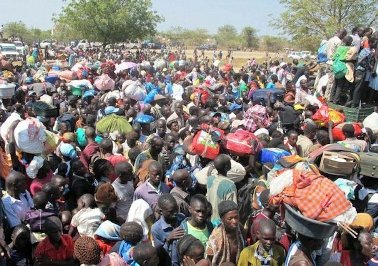S. Sudanese rebels claim over 40,000 people fled Unity state
September 16, 2015 (KAMPALA) – At least 44,000 people have crossed the River Nile from South Sudan’s oil-rich Unity state into neighbouring territories, a rebel official said.

He said several clashes between their forces and pro-government troops in Upper Nile and Unity states forced more people to abandon homes and flee for safety reasons.
“Every day, we are receiving huge numbers of people from Unity, Upper Nile and Jonglei states and majority of these populations come from Guit County,” stated Kuol.
Majority of those who crossed for safety through Phow state needed umanitarian assistance, he said, describing their conditions as “desperate” and “life threatening”.
“Many of the people arriving everyday here are in total crisis with severe hunger. They have no access to medicals, foods and shelters,” said the armed opposition official.
Kuol, however, urged humanitarians organisations to assess the conditions of those internally displaced in these areas before their conditions get out of control.
“These people are direly in need of serious assistance from international and faith based groups. Their conditions are too hard to predict since most of the children appeared to be having severe cases of malnourishment,” stressed Kuol.
The United Nations said most areas in Unity and Upper Nile states could not easily be accessed by aid agencies, due to continued hostilities between South Sudan’s warring parties.
Some parts of the country also lack proper roads making it difficult for non-governmental organisations to deliver medicines and food aid to the worse-affected communities.
According to Kuol, the majority of those who fled from Atar in Jonglei, Payikang county of Upper Nile and Guit county in Unity state have temporarily settled in Giraf highland.
The low rainfall in some part of the country has resulted into poor harvests, while continued fighting between the warring parties prevents people from cultivating crops.
A permanent ceasefire declared last month by both warring factions has failed to hold.
(ST)
